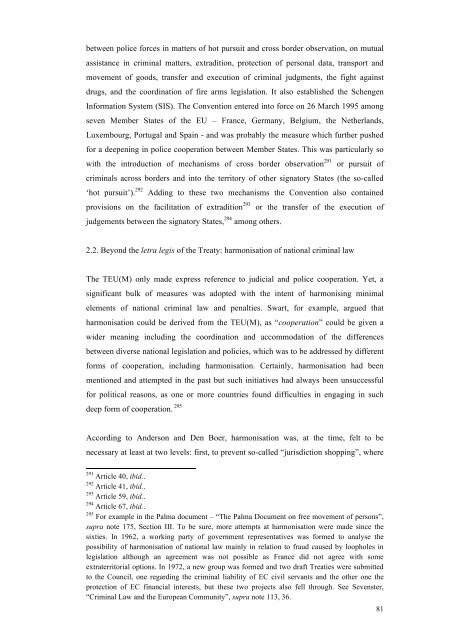The evolution of European Union criminal law (1957-2012)
The evolution of European Union criminal law (1957-2012)
The evolution of European Union criminal law (1957-2012)
Create successful ePaper yourself
Turn your PDF publications into a flip-book with our unique Google optimized e-Paper software.
etween police forces in matters <strong>of</strong> hot pursuit and cross border observation, on mutual<br />
assistance in <strong>criminal</strong> matters, extradition, protection <strong>of</strong> personal data, transport and<br />
movement <strong>of</strong> goods, transfer and execution <strong>of</strong> <strong>criminal</strong> judgments, the fight against<br />
drugs, and the coordination <strong>of</strong> fire arms legislation. It also established the Schengen<br />
Information System (SIS). <strong>The</strong> Convention entered into force on 26 March 1995 among<br />
seven Member States <strong>of</strong> the EU – France, Germany, Belgium, the Netherlands,<br />
Luxembourg, Portugal and Spain - and was probably the measure which further pushed<br />
for a deepening in police cooperation between Member States. This was particularly so<br />
with the introduction <strong>of</strong> mechanisms <strong>of</strong> cross border observation 291 or pursuit <strong>of</strong><br />
<strong>criminal</strong>s across borders and into the territory <strong>of</strong> other signatory States (the so-called<br />
‘hot pursuit’). 292 Adding to these two mechanisms the Convention also contained<br />
provisions on the facilitation <strong>of</strong> extradition 293 or the transfer <strong>of</strong> the execution <strong>of</strong><br />
judgements between the signatory States, 294 among others.<br />
2.2. Beyond the letra legis <strong>of</strong> the Treaty: harmonisation <strong>of</strong> national <strong>criminal</strong> <strong>law</strong><br />
<strong>The</strong> TEU(M) only made express reference to judicial and police cooperation. Yet, a<br />
significant bulk <strong>of</strong> measures was adopted with the intent <strong>of</strong> harmonising minimal<br />
elements <strong>of</strong> national <strong>criminal</strong> <strong>law</strong> and penalties. Swart, for example, argued that<br />
harmonisation could be derived from the TEU(M), as “cooperation” could be given a<br />
wider meaning including the coordination and accommodation <strong>of</strong> the differences<br />
between diverse national legislation and policies, which was to be addressed by different<br />
forms <strong>of</strong> cooperation, including harmonisation. Certainly, harmonisation had been<br />
mentioned and attempted in the past but such initiatives had always been unsuccessful<br />
for political reasons, as one or more countries found difficulties in engaging in such<br />
deep form <strong>of</strong> cooperation. 295<br />
According to Anderson and Den Boer, harmonisation was, at the time, felt to be<br />
necessary at least at two levels: first, to prevent so-called “jurisdiction shopping”, where<br />
291 Article 40, ibid..<br />
292 Article 41, ibid..<br />
293 Article 59, ibid..<br />
294 Article 67, ibid..<br />
295 For example in the Palma document – “<strong>The</strong> Palma Document on free movement <strong>of</strong> persons”,<br />
supra note 175, Section III. To be sure, more attempts at harmonisation were made since the<br />
sixties. In 1962, a working party <strong>of</strong> government representatives was formed to analyse the<br />
possibility <strong>of</strong> harmonisation <strong>of</strong> national <strong>law</strong> mainly in relation to fraud caused by loopholes in<br />
legislation although an agreement was not possible as France did not agree with some<br />
extraterritorial options. In 1972, a new group was formed and two draft Treaties were submitted<br />
to the Council, one regarding the <strong>criminal</strong> liability <strong>of</strong> EC civil servants and the other one the<br />
protection <strong>of</strong> EC financial interests, but these two projects also fell through. See Sevenster,<br />
“Criminal Law and the <strong>European</strong> Community”, supra note 113, 36.<br />
81
















